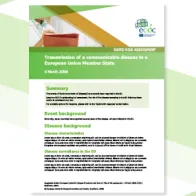ECDC statement on the SARS-CoV-2 Delta variant in the EU/EEA
Dr. Andrea Ammon, ECDC Director
Variants of SARS-CoV-2 are emerging at a significant rate worldwide. ECDC is constantly analysing the characteristics of these variants to rapidly inform public health authorities in the European Union. Some variants can put our efforts to control the pandemic at risk and require immediate actions.
Based on available scientific evidence, the Delta variant is more transmissible than other circulating variants and we estimate that by the end of August it will represent 90% of all SARS-CoV-2 viruses circulating in the European Union.
Unfortunately, preliminary data shows that it can also infect individuals that have received only one dose of the currently available vaccines. It is very likely that the Delta variant will circulate extensively during the summer, particularly among younger individuals that are not targeted for vaccination. This could cause a risk for the more vulnerable individuals to be infected and experience severe illness and death if they are not fully vaccinated.
The good news is that having received two doses of any of the currently available vaccines provides high protection against this variant and its consequences. However, about 30% of individuals older than 80 years and about 40% of individuals older than 60 years have not yet received a full vaccination course in the European Union.
There are still too many individuals at risk of severe COVID-19 infection whom we need to protect as soon as possible. Until most of the vulnerable individuals are protected, we need to keep the circulation of the Delta virus low by strictly adhering to public health measures, which worked for controlling the impact of other variants.
It is very important to progress with the vaccine roll-out at a very high pace. At this stage it becomes crucial that the second vaccination dose is administered within the minimum authorised interval from the first dose, to speed up the rate at which vulnerable individuals become protected. I am aware that it requires a significant effort from public health authorities and the society at large to achieve this goal. But now is the time to walk the extra mile. We have several safe and effective vaccines available and every single infection prevented now through our compliance with public health measures, is a life that can be saved by vaccination.
Audio-video statement
Current evidence
Based on the current evidence, the SARS-CoV-2 Delta (B.1.617.2) variant of concern (VOC) is 40-60% more transmissible than the Alpha (Β.1.1.7) VOC and may be associated with higher risk of hospitalisation. Furthermore, there is evidence that those who have only received the first dose of a two-dose vaccination course are less well protected against infection with the Delta variant than against other variants, regardless of the vaccine type. However, full vaccination provides nearly equivalent protection against the Delta variant.
Epidemiological forecast
Based on the estimated transmission advantage of the Delta variant and using modelling forecasts, 70% of new SARS-CoV-2 infections are projected to be due to this variant in the EU/EEA by early August and 90% of infections by the end of August. There is a well-documented age-risk gradient for SARS-CoV-2, where older age groups and those with underlying co-morbidities are more likely to be hospitalised or die due to COVID-19. In a scenario of 50% gradual reduction of non-pharmaceutical intervention (NPI) measures by 1 September, SARS-CoV-2 incidence is expected to increase in all age groups, with the highest incidence in those <50 years.
Modelling scenarios indicate that any relaxation over the summer months of the stringency of non-pharmaceutical measures that were in place in the EU/EEA in early June could lead to a fast and significant increase in daily cases in all age groups, with the highest incidence in those <50 years, with an associated increase in hospitalisations, and deaths, potentially reaching the same levels of the autumn of 2020 if no additional measure are taken.
Risk assessment
Considering the very high probability of the Delta VOC becoming the dominant variant in the EU/EEA:
- The overall risk of SARS-CoV-2 infection related to the expected increase in circulation of the Delta VOC for the general population is low for fully vaccinated sub-populations and high-to-very high for partially or unvaccinated sub-populations.
- The overall risk of SARS-CoV-2 infection related to the expected increase in circulation of the Delta VOC for vulnerable population is low-to-moderate for fully vaccinated sub-populations and very high for partially or unvaccinated sub-populations.
Since ECDC’s most recent risk assessment published on 10 June and given the expected future predominance of the Delta variant, the risk has increased for countries in all epidemiological situations. Without continued application of NPI measures and further rapid rollout of full vaccination, sharp increases in new infections, hospitalisations and deaths may be observed.
Key messages – options for EU and EEA countries response
Full vaccination of all groups at increased risk of severe COVID-19 should be achieved as early as possible to reduce the risk of hospitalisations and deaths. In order to achieve maximum protection in the shortest time possible, it is recommended that individuals at highest risk of severe outcomes for SARS-CoV-2 receive a second vaccine dose in the shortest possible interval following the administration of the first dose.
The continuation of vaccination rollout at current levels is crucial in order to keep the incidence levels at manageable levels, and that further acceleration of vaccination rollout, including achieving higher levels of vaccination coverage, could have a substantial impact on decreasing incidence, hospitalisations and deaths, particularly in older age groups.
Non-pharmaceutical interventions should be maintained at a level sufficient to contain community transmission of the Delta VOC until greater shares of the population are fully vaccinated, to avoid a resurgence of cases with a possible increase in hospitalisations and mortality.
Genomic surveillance of currently circulating variants (including weekly representative samples of sufficient sample size and targeted samples from special settings and populations) is of high importance to early detect and monitor for early detection and monitoring of emerging SARS-CoV-2 variants. Member States who require with the need for support to reach sequencing targets can use ECDC services for sequencing of SARS-CoV-2.
Full threat assessment
Share this page





